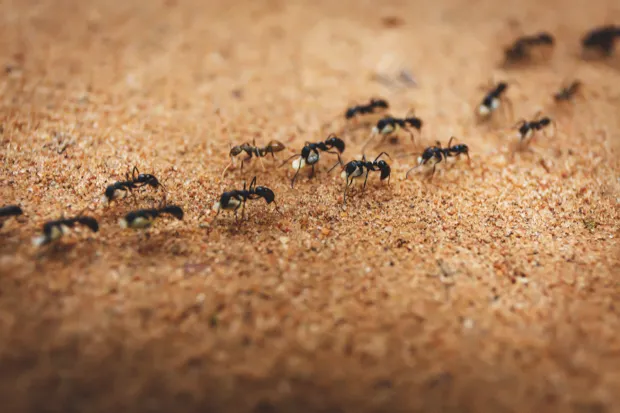How can we harness animal senses?
Humans have been using animals’ senses for thousands of years. Dogs are a great example: we’ve used their sharp sense of smell to help us hunt and, more recently, to help police locate drugs or explosives, and even to detect the presence of certain illnesses, like tuberculosis or cancer. Marine mammals have also been valuable, but in a different way: instead of utilising their behaviour directly, we’ve been inspired by their echolocating clicks. In 2010, scientists at the University of Southampton developed a new kind of sonar that works in shallow waters, based on dolphins’ ultrasonic signals.
Could we use insect senses too?

‘Sniffer bees’ may soon become a thing! Bees are currently being trained to detect various odours by a team at the University of Konstanz in Germany. For example, by exposing the bees to particular odours and rewarding them with sugar water, the bees can be trained to detect explosives used in land mines. The idea is that bees released into a land mine area would fly towards the mines, revealing the mines’ location without setting them off. The same team has also bred a strain of fruit fly whose antennae light up in different patterns when they smell cancer cells. It’s hoped that the research will lead to new kinds of medical screening techniques.
How else could we benefit?
Insects are a limitless source of inspiration. Take ants, for instance. These six-legged critters are brilliant navigators, foraging over large areas without getting lost. They do this by matching the ‘views’ seen during their route with those stored in their memory, allowing them to replicate a route they’ve travelled before. A collaborative UK project called Brains on Board is developing autonomous flying drones by translating ants’ and other insects’ visual systems into computer code. Current GPS systems rely on satellites, but these robots wouldn’t need external guides to navigate, making them especially valuable for search and rescue missions where GPS can get cut off.
Nastaran Tavakoli-Far is the presenter of Could Bees Take Over From Sniffer Dogs? an episode of CrowdScience. You can tune in to CrowdScience every Friday evening on BBC World Service, or catch up online at bbcworldservice.com/crowdscience
Subscribe to BBC Focus magazine for fascinating new Q&As every month and follow @sciencefocusQA on Twitter for your daily dose of fun facts.